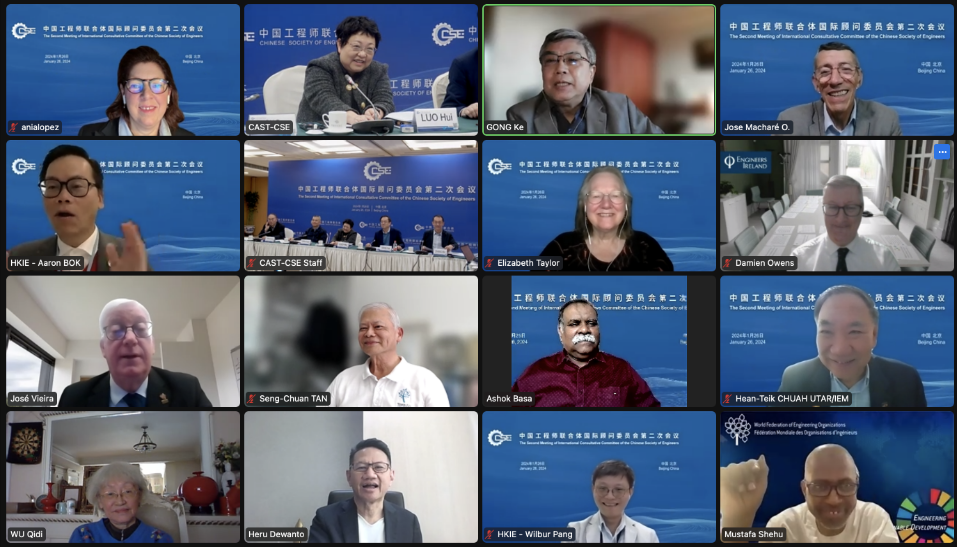The First International Consultative Committee (ICC) of the Chinese Society of Engineers (CSE) held its second meeting on January 26. The meeting was hosted by Prof. GONG Ke, Chair of ICC and Past President of the World Federation of Engineering Organizations (WFEO). Prof. WU Qidi, Director of the International Centre for Engineering Education under the auspices of UNESCO (ICEE) and Dr. LUO Hui, Director General of the Department of International Affairs of the China Association for Science and Technology (CAST), Vice Chairperson and Joint Secretary-General of CSE, attended the meeting and delivered speeches.
The meeting heard reports on CSE’s engineering capacity building and international exchanges in 2023 and its working plans for 2024. The CSE Engineers Multilateral Agreement Research Group introduced the application for membership of the International Engineering Alliance’s mutual recognition agreement on engineering competency and relevant questions to be consulted.
Members of the ICC affirmed the work progress of CSE over the past year and put forward their opinions and suggestions on the composition of the International Professional Engineers and APEC Engineers Monitoring Committee, consistency of engineering competency assessments, continuing professional development (CPD) activities, and CSE’s future development.

16 members of ICC from Asia, Europe, America, Oceania and Africa including GONG Ke, Mustafa B. Shehu, José Vieira, Elizabeth Taylor, Tan Seng Chuan, Damien Owens, Ashok Kumar Basa, Heru Dewanto, Refilwe Buthelezi, Ania Lopez, José Macharé, Chuah Hean Teik, Yuen Pak-Leung, Bok Kwok-Ming, WANG Xue, and SUN Fangping, as well as staff members from CAST Department of International Affairs, CSE secretariat, and CSE Engineers Multilateral Agreement Research Group participated in the meeting.
The International Engineering Alliance seeks to improve engineering education and competence globally through widening the recognition and uptake of its constituent Accords and Agreements. It manages 7 international accords/agreements—3 Accords related to the mutual recognition of engineering education including the Washington Accord; and 4 agreements about mutual recognition of engineering competence including the International Professional Engineers Agreement (IPEA) and the APEC Engineers Agreement (APEC EA). Among them, the Washington Accord outlines the mutual recognition of accredited engineering programs for four-year undergraduate students and establishes the educational requirements for professional engineering education. Similarly, the IPEA and the APEC EA establish an international standard of competence for professional engineering and a quality assurance system for maintaining such standards. They ensure the substantial equivalence among member organizations through regular review of their standards and quality assurance systems.